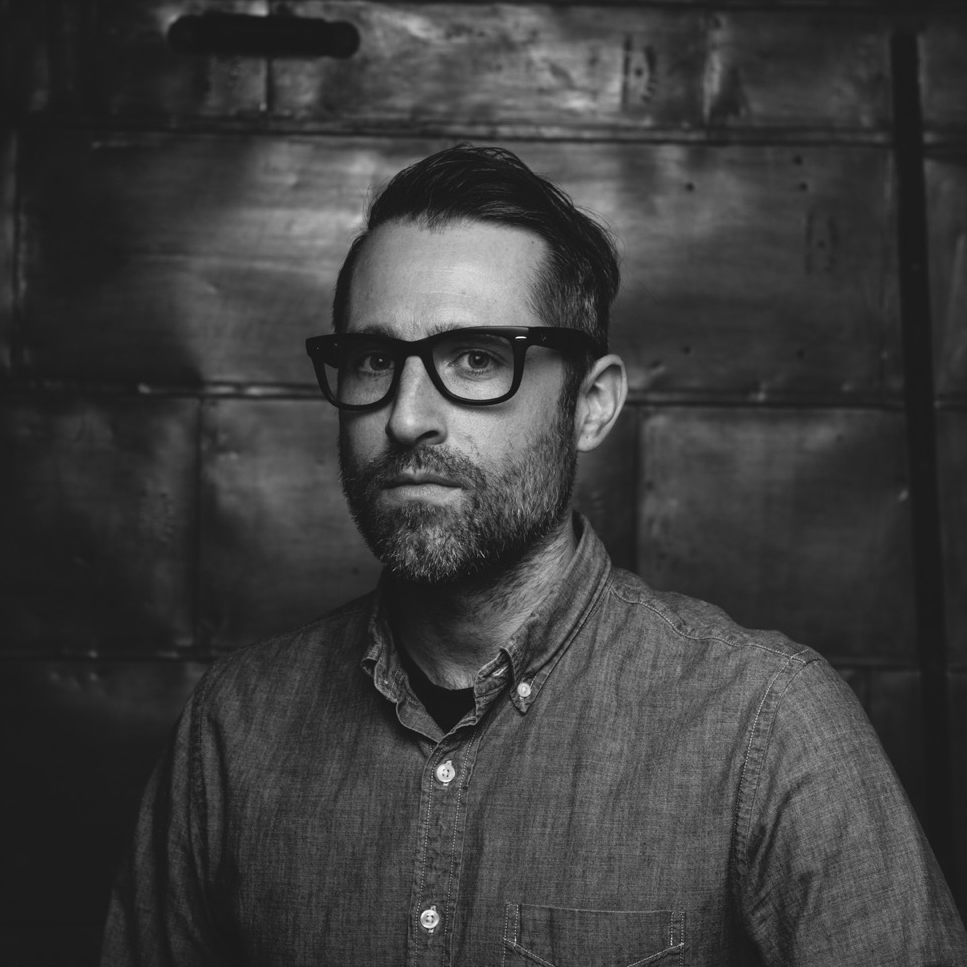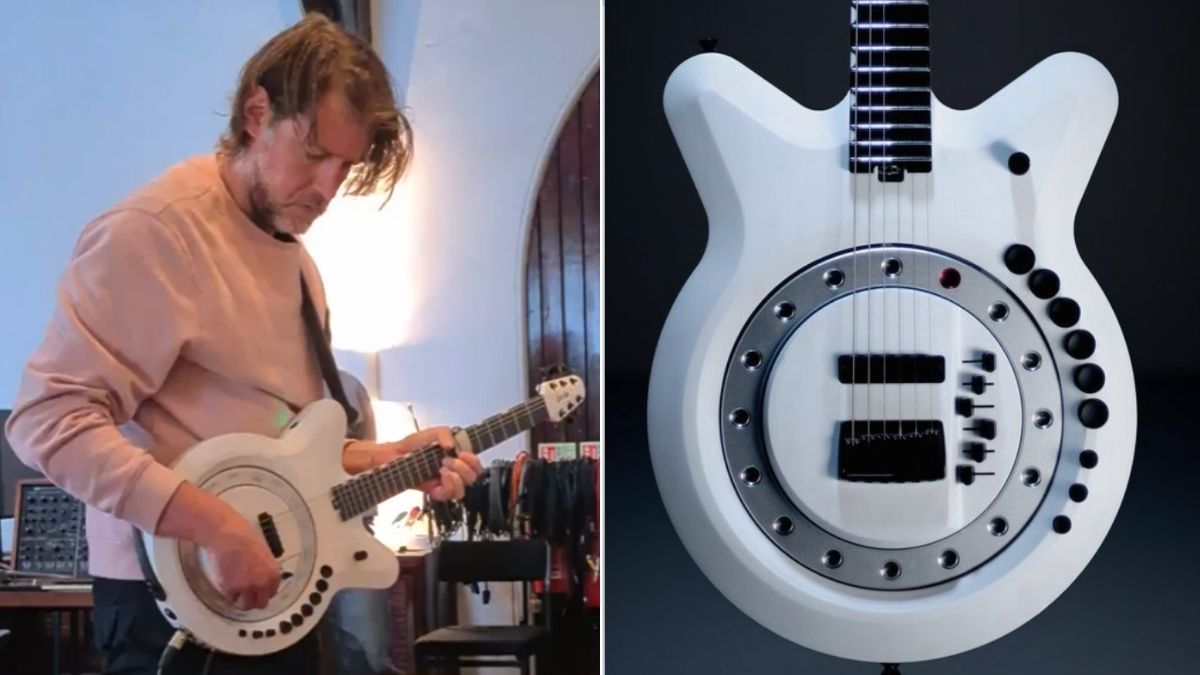Interview: Lamb of God's Mark Morton and Willie Adler Discuss the Band's New Album, 'Resolution'
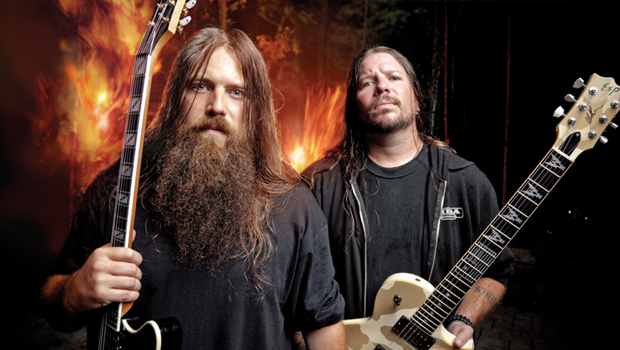
It’s the week before Christmas and the country homes outside of Richmond, Virginia, are decorated in traditional holiday fashion, with blinking colored lights, wreaths and American flags.
The mild temperature creates the feeling of a crisp fall day, and there’s a festive, peaceful vibe as we drive through the winding rural roads.
Guitar World has come here to hang with Lamb of God’s Mark Morton and Willie Adler to discuss the group’s latest album, Resolution. But the setting is strangely at odds with what we expected to find when we set out to meet the guitarists behind modern metal’s biggest group.
Just as we start thinking that we’ve driven into the pages of a genteel Southern Living magazine spread, we turn a corner and hear the loud blasts of a sputtering engine. Seconds later, a rider on a fat-tired minibike jets out of the woods and skids to a stop a few yards in front of us.
It’s Morton, who motions for us to follow him. A minute later we find ourselves entering the Morton compound, which consists of a stately main house and a freestanding two-story garage situated on several acres of wooded land.
Dressed in a black hoodie, army camo shorts and long underwear, Morton dismounts the minibike and extends a handshake. He leads us into the garage, which turns out to be the kind of man cave that any red-blooded American guitarist would want for Christmas. Morton, who likes to build cars in his spare time, shows us two of his latest: a 1972 Cutlass muscle car and a 1981 Cutlass 455 drag racer.
“I’m a huge NASCAR fan,” he says. “I race the ’81 Cutlass in the quarter-mile. My new project is the ’72 Cutlass, which is from the same year that I was born.” From the garage, it’s just a short walk up the stairs to Morton’s jam room, where we find ourselves amid stacks of Marshall, Fender, Sunn and Mesa/Boogie amps, scores of guitar cases and other rock and roll amenities (including a mini-fridge stocked with beer and moonshine).
All the latest guitar news, interviews, lessons, reviews, deals and more, direct to your inbox!
As we kick back and wait for Adler to arrive, Morton begins talking about the making of Resolution. The band’s seventh LP, Resolution is a mix of brutal grooving thrash and technical wizardry, and it includes their most diverse and progressive work to date. The tracks are satisfyingly ripping, but they are also eclectic in a way that you might not expect from Lamb of God. While some fans might think the album is a conscious effort to break with the group’s past, Morton says nothing could be further from the truth.
“There’s a misconception that we have this primary directive to stick to certain guidelines,” he says. “But it’s just not true. There is no rulebook. In fact, there’s an unspoken current between us where we’re like, ‘Let’s see if we can get away with this.’ ”
Since they first emerged in the mid-Nineties, Lamb of God have released some of the most exciting, technical and bludgeoning music in the metal scene. The consistent quality of their albums—including their 2000 breakthrough record, New American Gospel, 2004’s fan favorite Ashes of the Wake, 2006’s modern-metal benchmark Sacrament and 2009’s raw, organic-sounding Wrath—has elevated their status.
For millions of headbangers, Lamb of God are simply the most important contemporary metal band in the world. It’s exactly the focus and fury of their output that has also caused fans to jump to the conclusion that the band has methodically charted its career with a compass pointed directly at metal purity.
But as Morton explains, the band has in fact grown increasingly comfortable with expanding its sonic horizons. As befits any genre leader, Lamb of God keep things interesting for themselves with their ambitious creativity, an approach that is also crucial to keeping the genre fresh, relevant and evolving.
Lamb of God’s first blatant attempt at expanding their sound—and the receptiveness of their audience—was heard on 2009’s Wrath. On that record, they moved away from the multitracked guitars and modern production of the massively popular Sacrament and returned to a purer live guitar sound. They also wrote a few tracks that hinted at their ability to diversify: “The Passing” was a melodic, midpaced and moody opening track, while “Reclamation” and “Grace” featured acoustic and clean intro passages, respectively.
Lamb of God were rewarded for their efforts when Wrath reached the Number Two spot on the Billboard Top 200 upon its release. But their intention to push sonic boundaries has never manifested itself more clearly and prominently than on Resolution.
“At this point, we’re not inhibited that something might be received as un-metal,” Morton says. “We are a bit governed by the fact that Randy [Blythe] is not a particularly melodic singer, so there’s always going to be gruff, aggressive singing over 99 percent of the stuff. With that said, there are a couple of cleaner vocal parts on the new record. But it’s really what we all decide we can get away with, like the song ‘To the End.’ We originally called it ‘ZZ Top,’ because the riff sounds like ‘Just Got Paid.’ It’s one of the most rock and roll songs we’ve ever done.”
Resolution exudes the pure thrash attitude and technical prowess that fans have come to expect from Lamb of God, but the 14-song disc unfolds like no other LoG release. The tracks are sequenced as if the album is divided into two separate sides, like a vinyl record, a quality that gives it the arc and diversity of a classic epic metal album along the lines of Metallica’s Ride the Lightning or Pantera’s Vulgar Display of Power. The disc unselfconsciously moves from sludgy doom (“Straight for the Sun”), archetypal thrash (“Desolation” and “Ghost Walking”) and instrumental interludes (“Barbarossa”) to punk (“Cheated”), clean/dirty vocals (“Insurrection”) and orchestral, operatic metal (“King Me”).
At a stage in their career when some bands might be tempted to ease up a bit and hit cruise control, Lamb of God are firing on all cylinders as they confidently blaze into this uncharted territory. Morton’s meticulous rhythm playing and his hybrid lead style—a mix of acrobatic shred runs, ballsy bends and bluesy melodies—have evolved into distinctive calling cards.
Adler’s unconventional songwriting style and visceral riff work shine throughout Resolution and act as the perfect counterpoint to Morton’s analytical, schooled approach to composition. Vocalist Randy Blythe has harnessed the raw power of his rich, ragged growls, and his vicious, call-to-action vocals have grown surprisingly articulate. Holding all this together is the precision rhythm machine of John Campbell and Chris Adler. Campbell locks into the groove and never lets it stray, while Chris Adler simultaneously propels and colors the rhythms, and plays the drums as a kind of third lead instrument in the mix.
What’s more, Resolution not only proves the guys have successfully expanded their sound but also represents how they have overcome the inevitable personal and professional growing pains experienced from working in the music industry. “The album name has a few different meanings,” Morton says. “One of them is finality, or the end of a phase. It can also mean someone’s strength of will, or it can be used to describe the clarity of an image. The idea is that we’ve finished certain struggles and conflicts in our personal lives, and through that process we’ve found ourselves with a clearer vision.”
As Morton finishes, Willie Adler enters the room, cracks open a beer and grabs a seat on the sofa, ready to join an in-depth conversation about the making of Resolution. In the following interview, he and Morton expand on Lamb of God’s new vision and tell how they came to create the most highly anticipated thrash metal record of 2012.
GUITAR WORLD: With Resolution, you guys seem to be pushing the limits of what people expect from Lamb of God. Is there someone in the band that acts as the metal quality-control dude so that you don’t stray too far off course?
MARK MORTON: I think Chris is probably the metal purist, though it’s more like he acts as a referee between Willie and I, because we’re the composers. With Willie, you have a very—and I say this with the utmost respect—unschooled, untrained and peculiar approach to playing avant, acrobatic and technical metal. Then you have me, a misplaced blues player in a metal band. We’re both throwing riffs at Chris, who’s one of the best metal drummers in the world, and he’s left with the monumental task trying to make it all work out. But I think that process is a big part of what makes us Lamb of God. And when I say that about Willie, there is always a mode, scale, chord or position that applies to everything he does…
WILLIE ADLER: …except I have no idea what they are! [laughs] But I actually think it’s beneficial to me.
MORTON: More than beneficial, I think it’s the key to your genius. Sometimes I get caught up, like, “Is this Mixolydian, Dorian or Aeolian?” He doesn’t trip over that shit.
Lamb of God’s thrashing, heavy grooves are always a point of conversation when people talk about the band. Willie, do you feel that you and your brother, Chris, have a special intuition when it comes to locking in on rhythms?
ADLER: I think because Chris and I started playing together as kids we were more in sync early on. But considering how long Lamb of God’s been playing together at this point, I wouldn’t say we’re more synched up than anyone else in the band.
MORTON: From my perspective, I feel like I know what Chris is going to do before he does it. And I think he would say the same thing about me. If we started playing and I told him I had two riffs, we would change at the same point. Chris and I butt heads on everything else, but we turn on a dime together. Even though we’re not blood, we are really intuitively locked in, and I think it has to do with our shared influences and the fact that we’ve been playing together for so long. Actually, I think Chris has me figured out more than he does Willie.
ADLER: I think he does too. It’s funny, because sometimes I’ll be playing a riff with a specific drumbeat in my head, but Chris will do something 180 degrees different. It’ll turn out fine but totally different from what I expected.
MORTON: Here’s how it goes: When I bring in a riff, Chris will go, “Okay you want this…” And it’s exactly what I wanted. Then he’s like, “I knew that’s what you’d want, but can I do this…” And I’ll be like, “I hate it.” Then the next day I’ll come in and he’ll play the one I want him to play, with this really long face. [laughs] Then I’ll be like, “Wait, what was that other one again?” He’ll get all excited, play it, and it’ll be perfect. [Mark and Willie laugh] Then, of course, Willie will be like, “Oh yeah, that one was way cooler.”
ADLER: [laughing] Yup, that’s pretty much how it goes.
I read a recent interview in which Chris talked about working with Matt Halpern, the drummer from prog-metal act Periphery, to learn new riffs and to “keep up with what’s out there.” As guitarists, are you keeping tabs on what these new young players are doing?
MORTON: Not at all. I’ve got so many riffs flying around my pickled noggin as it is.
ADLER: Yeah, I’m not really paying attention either. And that’s not to take anything away from people out there. I’m sure there are 18-year-old kids that can absolutely play circles around me. But we don’t keep up with that, and I think that’s actually what separates us from everyone else.
MORTON: I’m trying to launch off of each step in our discography. I view everything we do in the big picture, like it’s all one piece of work. Because at the end, when we stop and look back, I’m not gonna look at one piece; I’m gonna look at the whole stream of consciousness that runs through our discography. So I’m not really worried about what Periphery are doing. I’ve seen them. I know what they do and it’s fantastic. But for that to impact what I do, well, that’s just not where my head’s at.
When did you first start writing for Resolution?
ADLER: We started the writing process a lot earlier on this record, during the touring for Wrath.
MORTON: One of the big differences on this album was that I started using simple recording software to help document my ideas and flesh them out. We’d get a day off in Thailand or wherever, and I’d be in my hotel room for a couple hours putting down some riff ideas, whereas before we’d usually just hope that we’d remember the best ones when we went to rehearsal after we got home from tour. It’s not the first time we’ve written stuff on the road, but that process certainly flourished more on this record. I think that’s because of Wrath’s extensive touring, combined with Willie and me becoming more comfortable with personal recording software.
What are your go-to home-recording programs?
MORTON: I have Pro Tools, but I’ve found it’s much simpler for me to just use GarageBand. Some of my demos for the new tunes were relatively sophisticated, too, with bass lines, two guitar tracks, solo, programmed drums and vocals. And GarageBand was just the easiest way to get all those ideas down.
ADLER: I use Cubase, just because it was the first software I learned and I didn’t want to go through the learning curve of Pro Tools. I had a ton of fun with it, too, laying down bass lines, two guitars and drums. I got so into it that it’d be like, “Holy shit! Eight hours just went by.” There’s something to be said about documenting jam sessions. You never know when one might come in handy later.
MORTON: In my case it’s mostly about putting down a demo that I’m going to present to the band as a song idea. But sometimes I write something that I have no intention of turning into a Lamb of God song, like the intro to the record, “Straight for the Sun.” That song was originally just a tune I came up with for fun. I was playing around in my studio and trying to make a doom song like Neurosis. I wrote and sang the lyrics, added a bass line and put drums to it. I had played it for a few of the guys and our producer Josh [Wilbur], but more just like, “Hey, check this out.” But toward the end of the writing process, it came up as an option to start the record, almost like an anti–“The Passing,” which started our last record.
That was a very melodic and beautiful guitar piece, where “Straight for the Sun” was the antithesis. So that track was never meant to be a Lamb of God song, but now it very much is, because everyone played on it and it starts off the record. As it relates to demoing, that piece was an example of how becoming fluent with recording software can open you up to channeling creativity in a very quick and useful way.
The second track, “Desolation,” dovetails perfectly with “Straight for the Sun.” Was it written at the same time?
MORTON: That was written separately. But the way Chris does the drum solo into it makes them blend very nicely together. “Desolation” was written very much the same way: me in my rehearsal studio doing a demo. But I knew I was writing a metal song and had it pointed in the direction of Lamb of God.
Resolution’s production is much similar to Wrath’s in that the amps have an almost oldschool sound, rather than the pristine modern metal tones on Sacrament. Can you talk about how you got those sounds?
MORTON: During Wrath, right around the time Josh Wilbur started producing, we fell into this amazing perspective of actually dialing in our guitar sounds before we recorded. [laughs] On Sacrament and Wrath, it was pretty easy to determine which song was Willie’s and which was mine because we’d each record a right and left guitar track on our own song.
On this record, we both played on each other’s songs: I’m on the right and he’s on the left. We played and recorded them with a guitar tone that’s much like what you’ll hear when you see us live. It’s more of an accurate representation of our sound. I thought Sacrament sounded good; it just didn’t sound like Lamb of God. And even though I love Gene “The Machine” Freeman, I hated the guitar tones on Ashes. Those guitar tones were awful. It took me awhile to get the confidence to say, “That’s not what we sound like. How about we put a mic in front of an amp and see how that sounds.” Because I really think we have some killer tones.
PREVIOUS PAGE: GO TO PAGE 1 OF 3
What are your current amp setups this time around?
ADLER: I’ve been running a [Mesa/Boogie] Mark IV for a while, but lately I’ve been getting into the Mark V. The Mark V seems to have a little more range as far as bringing up the bottom end and having a little more gushy-ness. So right now I’m just combining both of them.
MORTON: I recorded most of the basic rhythms with a Mesa/Boogie Mark IV. Then late in the session my friends at Mesa sent me a Royal Atlantic [RA-100], and I fell right in love. We only had a week left of guitars, but I took it right into the studio to record with. I’m gonna start using the Royal Atlantic live, too. It’s the perfect blend of the creamy, smooth, tight saturation that I love about the Mark IV, but it’s got a tight, modern bottom-end sound that the Mark IV needed help with. The Royal is so easy to navigate, too. I love that amp. So I told Mesa to send me eight of ’em. [laughs]
What are the main guitars and effects in your arsenal right now?
ADLER: It’s pretty straightforward: just my signature ESP Eclipse, the Mesa/Boogie Mark IV and V, and the DBX 266XL compressor/gate.
MORTON: My setup has changed for the first time in awhile, and I’m pretty excited about it. In the studio I use my Jackson Dominion signatures and my ’75 Gibson Les Paul Deluxe goldtop. Someone before me routed it out for PAF pickups, which made it worth nothing. But it’s a killer guitar. It looks like a piece of shit, but it has sound and soul for light-years. I also used my Fender Tele Deluxe ’72 reissue for some clean stuff, my Guild D-55 acoustic for a couple intros and a Jackson Soloist for most of the solos.
I’ve also just developed a new signature DiMarzio pickup, called the Dominion. The idea developed because I’d never found the right balance of attack, sustain, thickness and mass in any other pickup. We tried so many different approaches, but when we finally hit it, everyone involved realized that we had a really unique piece. I’m glad it’s going to be available to other players.
As far as effects, in the studio we have a couple milk crates with stuff that we try. I use a lot of MXR pedals, like the Carbon Copy delay, and I’ve started using this Green Rhino overdrive for a little bit of a solo line boost. Live, I usually use a Dunlop rack wah, but lately I’ve been into the Jerry Cantrell wah. I also use the DBX 266XL compressor/gate rack unit in front of my preamp to tighten things up a little bit.
Let’s talk about some specific tracks. The solo break in “Ghost Walking” is really well constructed. You move from sweeps to blues to a blazingly fast climbing run. Is that tedious to piece together? Or are you playing it off-the-cuff?
MORTON: I didn’t know what I was gonna do with these solos when I came in. I only knew where they were gonna be. When it came time to record, Josh would roll tape and I’d improvise stuff for a few passes. Then we’d put a comp together, and I’d work on nailing a final take based on that comp.
ADLER: That one, in particular, was funny. I was in the other room recording a track, and Mark walks in looking like he’d just run a marathon. He was all red in the face and sweaty and goes, “Dude. I just wrote the best fucking solo of my life.” [laughs]
MORTON: Yeah, Josh and I were pretty pumped on it. But I’m not sure it’s the best solo I’ve ever written. I think “Grace” [from Wrath] might be a little more lyrical. But this one is up there. I’m pretty proud of it.
Willie, what is a standout moment on this record for you?
ADLER: “King Me” is definitely one. At first the whole beginning of that track was tied into a different song, but it wasn’t sitting as well. It sounded more like two halves of a song instead of one complete piece. Josh was like, “This front end is so killer. Go home and work something out for it.” So I went back and wrote the real choppy verse, bridge and chorus. Once we started tying those riffs together and everyone got involved, we knew it was going to be a monster epic.
MORTON: We all knew it was going to close the record, because it had these big landscapes and a dramatic vibe to it. It was already a great song, but when Josh came up with adding the choral vocals and the strings, that really launched it into the stratosphere. It became a completely different tune, to the point that even the writer was a little uncomfortable about it. [everyone laughs]
ADLER: A little bit, yeah. We were going back and forth listening to different mixes with different levels of the strings and the opera singer. I was nervous as shit. It was really one of those moments like, “Can we really get away with this?” Josh, Mark and Chris were like, “Dude, it’s fucking perfect.” I trusted them, and the more I listened to it, the more confident I became about it.
The instrumental track “Barbarossa” acts as a nice interlude that breaks the record in a traditional LP style.
ADLER: I had written that at first as an intro to another song. But we realized it worked great by itself to separate the two halves of the record.
MORTON: This is very much an album, not just a collection of songs with the best ones first and the worst ones last, and “Barbarossa” sits where it does because of that. It’s a perfect reset and cleanses the palate a bit for the second half of the record. We’ve always tried to have ebb and flow to our records; Resolution is probably our best job of doing that.
Mark, “Cheated” is one of your more punk rock songs, and it even gives a nod to the Sex Pistols with the lyrics “Ever get the feeling you’ve been cheated?” [a quote spoken by Johnny Rotten at the Pistols’ final show]. As a young player, were you inspired by Seventies punk?
MORTON: I’m into punk, but more like Nineties punk, like the Jesus Lizard, Shellac and the Touch and Go and Dischord scenes. I played in punk bands a bit when I was younger, but it was “punk” in the avant sense: heavy, oddball music with offensive tones. But I do think “Cheated” sounds very much like the traditional Seventies punk of the Sex Pistols.
Randy and I have always tried to put some element of punk in all of our records, with songs like “Contractor” [on Wrath] and “What I’ve Become” [from Ashes of the Wake].
The song “Terminally Unique” is a crazy drum workout with a really great groove to it. How did that it come together?
MORTON: That’s an interesting song. Josh pointed out that we were missing a track that had that 6/8-time feel of “Laid to Rest.” He also wanted us to write a song together, rather than just doing songs that Willie or I brought in. So we all wrote it together off the cuff. But because it wasn’t a song that one of us brought in, no one was really championing it.
ADLER: Initially, that was the throwaway song for me.
MORTON: Same with me. But as the vocal got completed, the song really started to grow on me.
“Visitation” has a really burning, yet grooving, Randy Rhoads–on-speed type of solo. What’s the thought process behind composing a solo like that?
MORTON: I’m never gonna be the fastest guy on the block, and I don’t even wanna be in that rat race. I just want to connect with the instrument, and I’m libel to bend a note and hold it for two bars. I’m not scared to do that. There’s a liberating feeling that I get from just playing what comes out. I think my biggest goal as a lead player is for someone to hear a solo and say, “Oh, that sounds like Morton.” I’d rather have a recognizable sound than be known as the fastest alternate picker or the guy who knows all the modes. To me, it’s more important to have a style and a sound.
I try to make it a memorable part of the song. Because if I just keep trying to play one fast lick after another, I’m gonna run out of licks really quickly. [laughs] My favorite guitarists have always been the guys that aren’t the most technically proficient but who have a signature style and character to their playing. I’ve definitely always worn my influences on my sleeve. Anyone that listens to me can tell I’m into Jimmy Page, Hendrix, Zakk Wylde and Randy Rhoads. I definitely reference the people who I enjoy listening to. I certainly wouldn’t put myself in the same category with them, but you shoot for the stars and see what you get.
START AGAIN: GO TO PAGE 1 OF 3
PREVIOUS PAGE: GO TO PAGE 2 OF 3
Photo: Travis Shinn
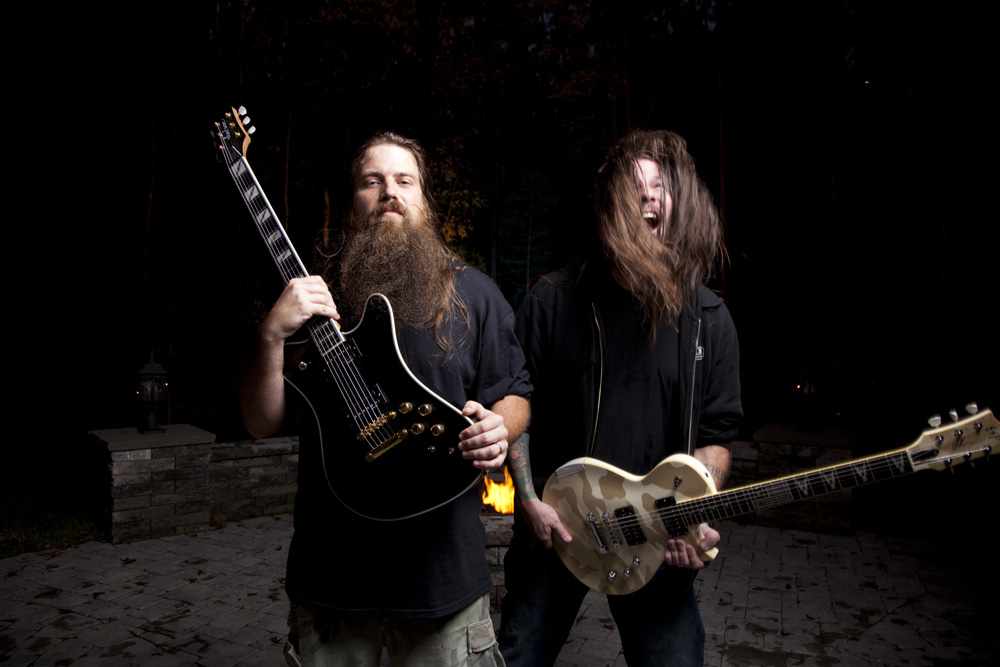
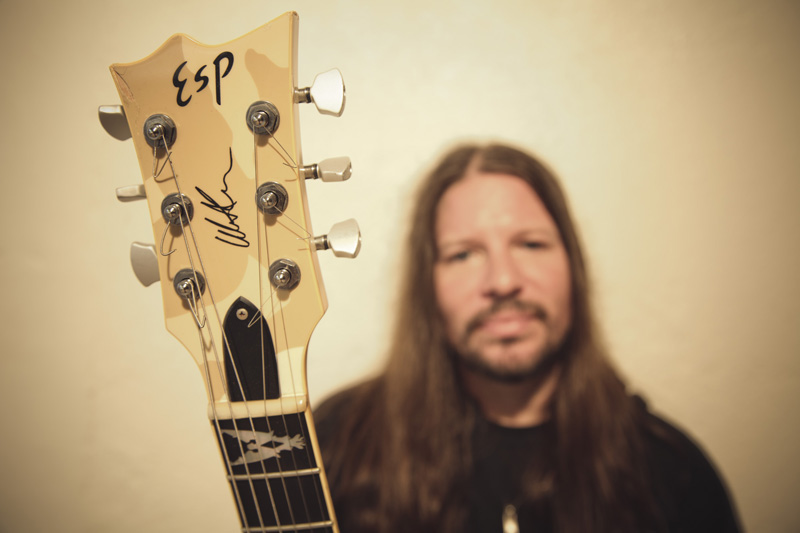
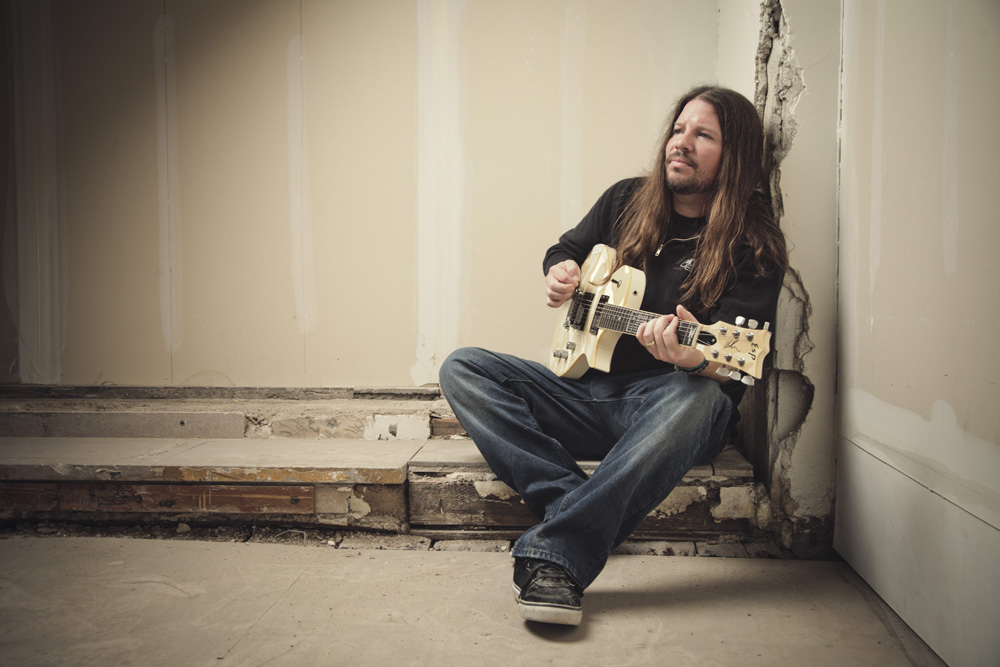
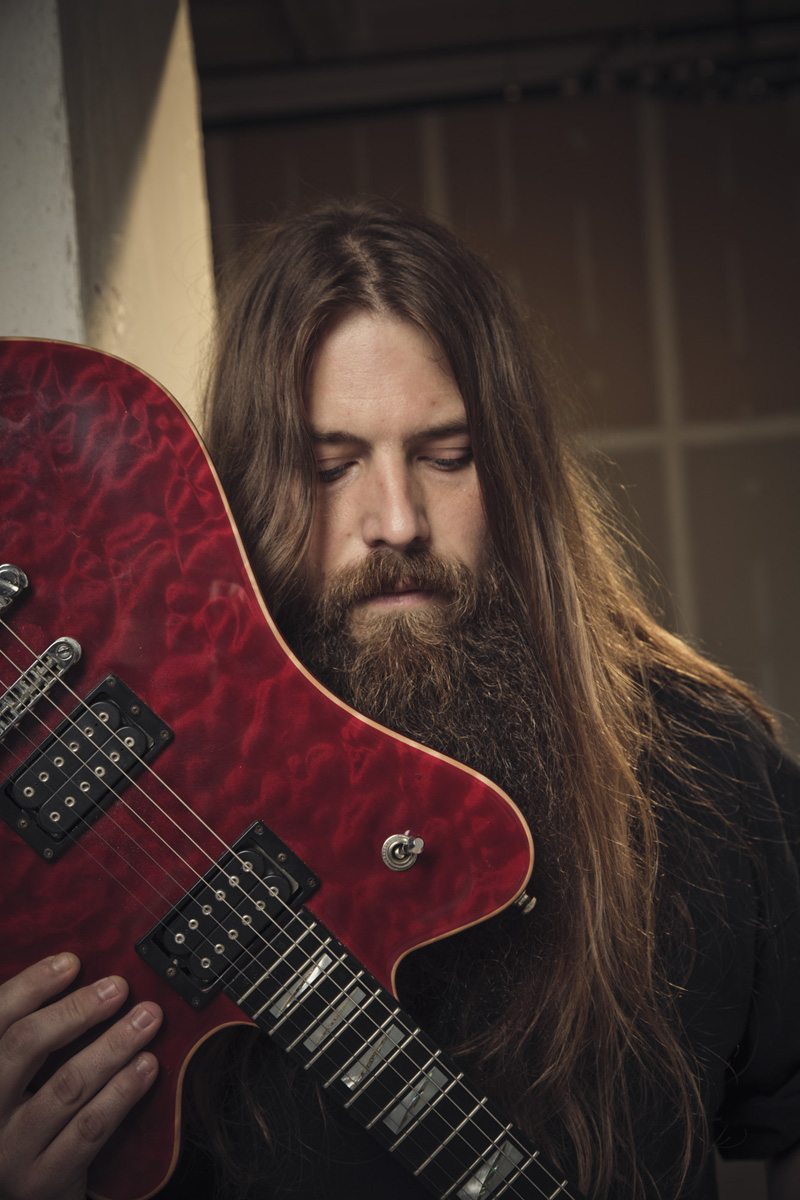
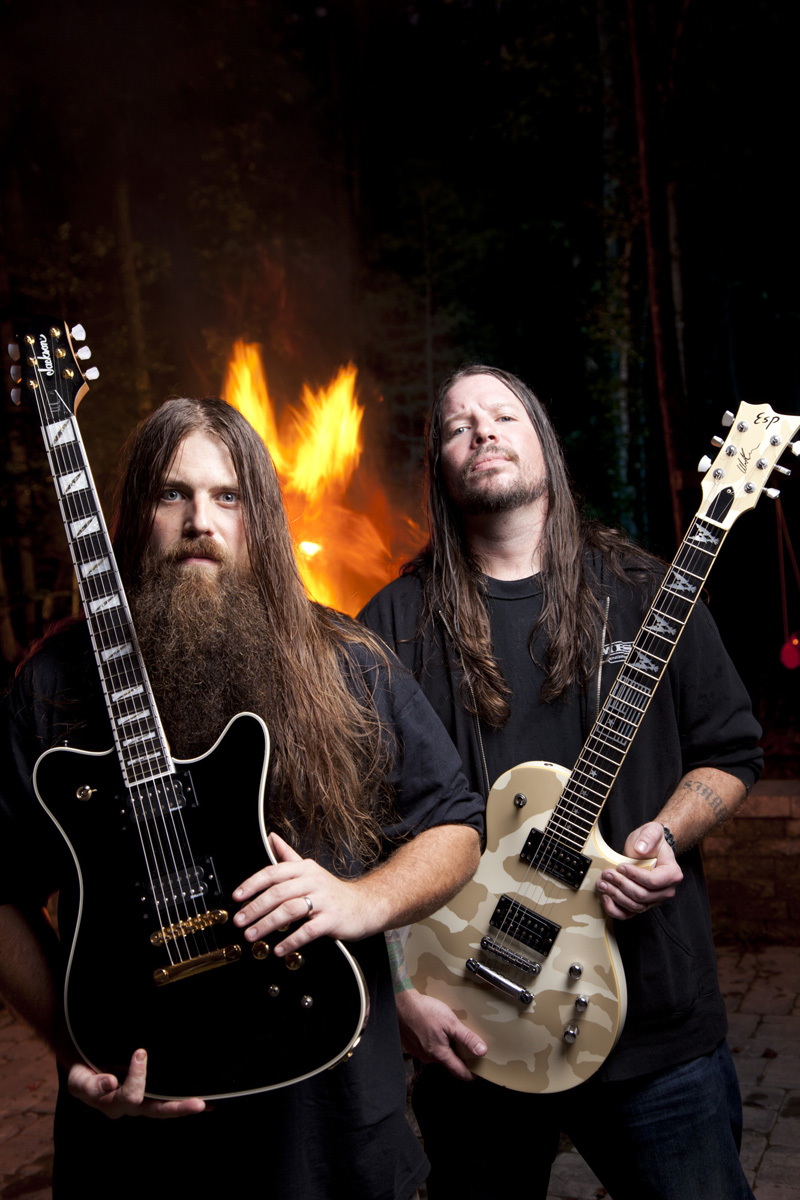
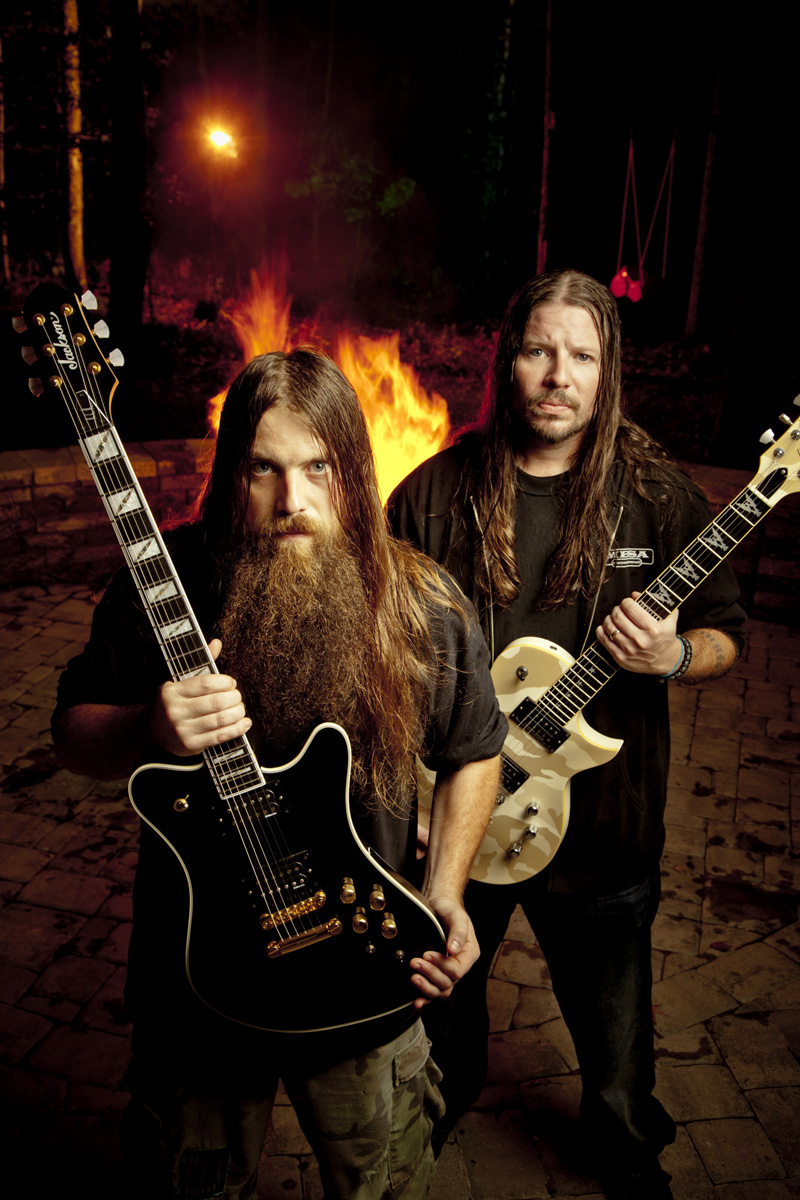
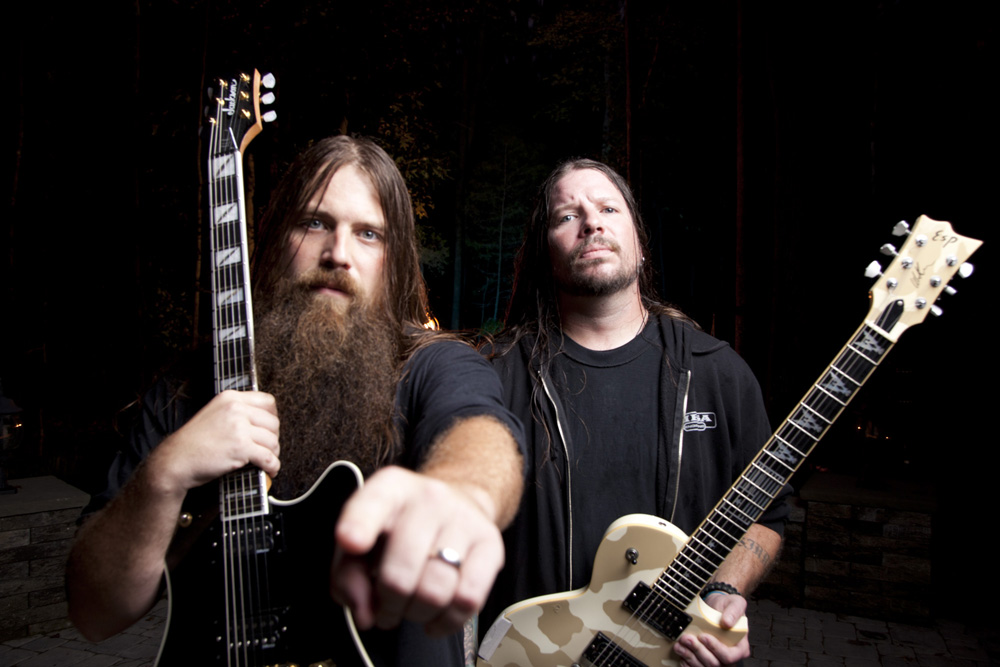
Brad is a Brooklyn-based writer, editor and video producer. He is the former content director of Revolver magazine and executive editor of Guitar World. His work has appeared in Vice, Guitar Aficionado, Inked and more. He’s also a die-hard Les Paul player who wishes he never sold his 1987 Marshall Silver Jubilee half stack.
